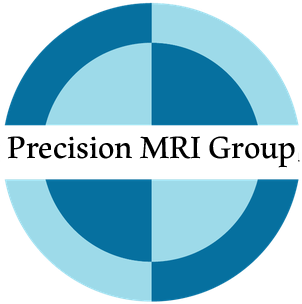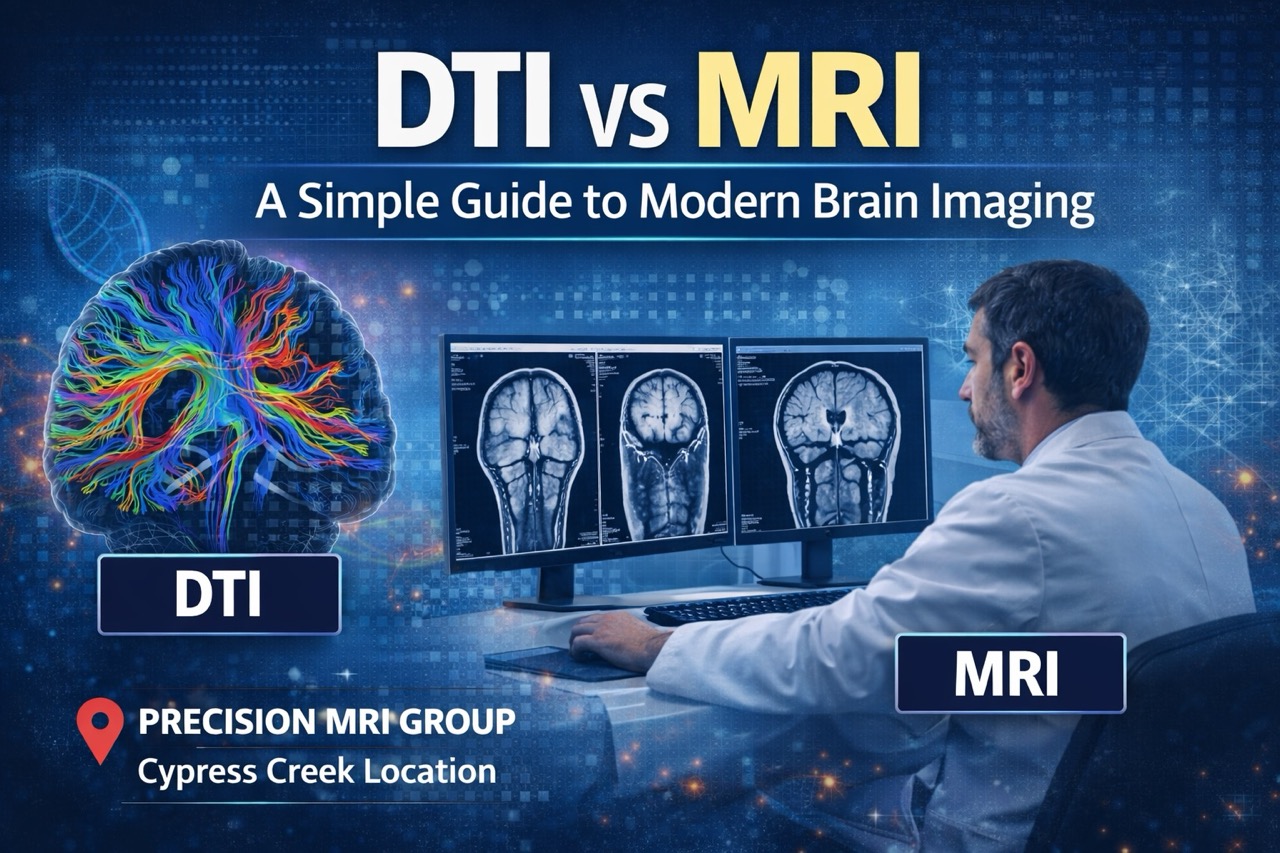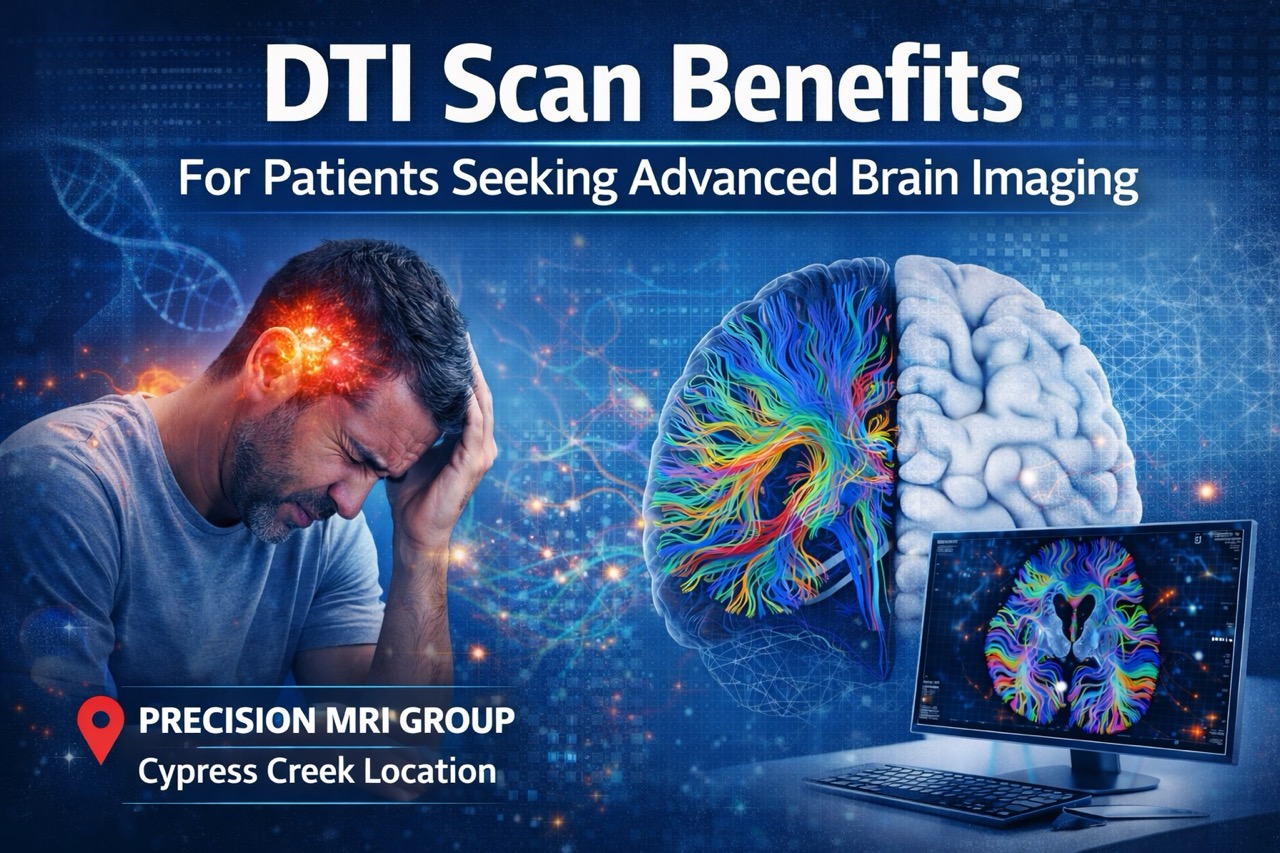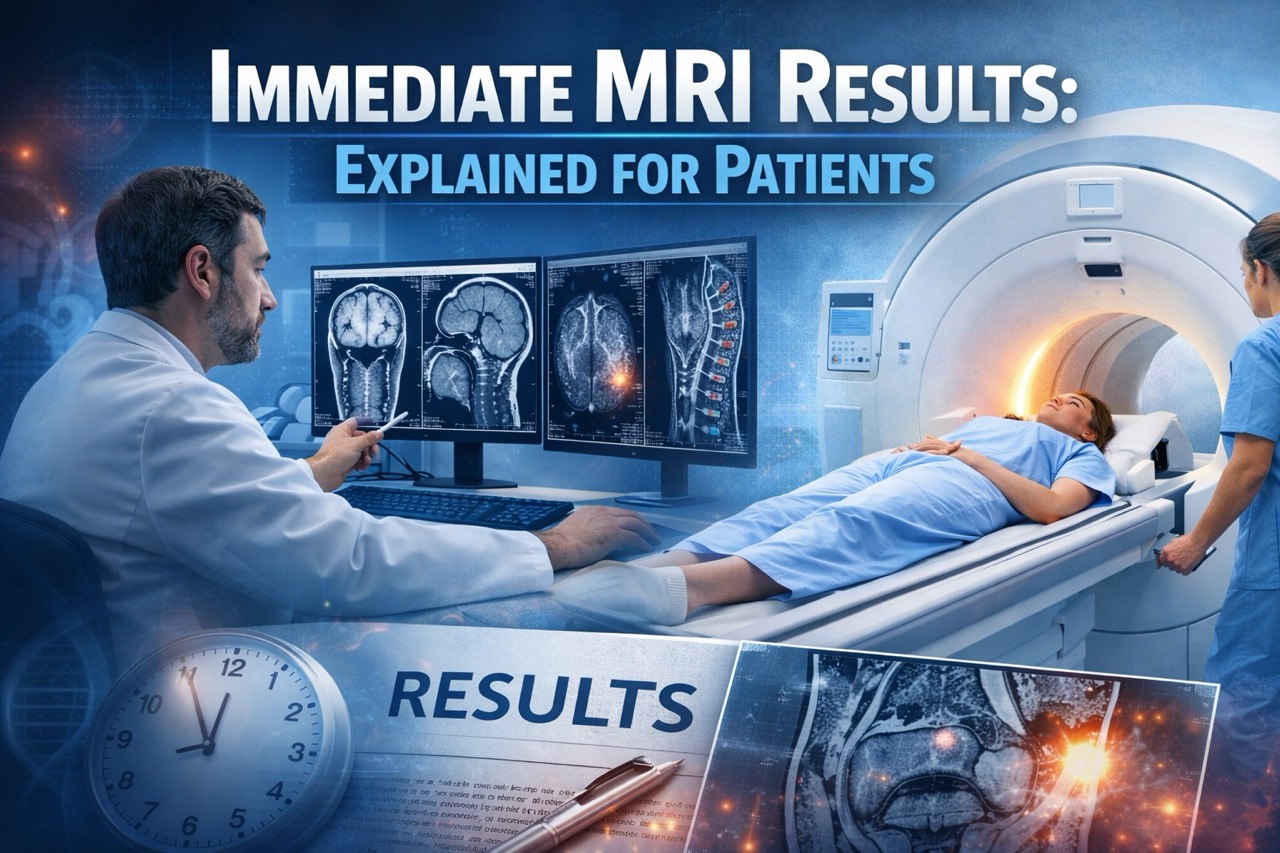MRI After Sports Injury: Key Signs You Shouldn’t Ignore
You felt something pop during your basketball game, and now your knee won’t stop swelling. Your shoulder aches after that awkward fall during practice, making simple movements painful and difficult. Athletes face a common question after injuries: when should I get imaging done for diagnosis?
A sports injury MRI provides the detailed answers you need when pain persists or movement becomes limited. This advanced technology detects soft tissue injuries that other tests miss completely, revealing damage to ligaments and tendons. Furthermore, sports injury MRI scans at Precision MRI Group offer same-day appointments and flexible hours. Our board-certified radiologists deliver results within 24 to 48 hours, helping you start treatment quickly. Additionally, MRI sports injury evaluations provide the clarity needed for confident recovery planning and decisions.
Why MRI Matters After a Sports Injury
MRI technology excels at showing soft tissue damage that causes persistent pain after athletic injuries. Unlike X-rays that only reveal bones, MRI displays ligaments, tendons, muscles, and cartilage with clarity. Common sports injuries include ACL tears, meniscus damage, rotator cuff strains, and cartilage deterioration.
These soft tissue problems often cause long-term complications when missed or diagnosed incorrectly by examination. A sports injury MRI reveals the exact location and severity of damage inside your joints. This precision helps doctors distinguish between minor strains and serious tears requiring different treatments.
Early detection through sports MRI prevents complications that develop from untreated injuries over time. At Precision MRI Group, our modern medical imaging technology provides the detailed views doctors need. Furthermore, same-day appointments mean you don’t wait weeks while uncertainty and pain continue unnecessarily.
Signs You Need an MRI After an Injury
Certain symptoms after athletic injuries indicate you need advanced imaging for proper diagnosis. Recognizing these warning signs helps you get appropriate care before problems worsen significantly. A sports injury MRI appointment should be scheduled when these symptoms appear and persist.
- Persistent pain that lasts longer than expected – Pain continuing beyond a few days suggests structural damage.
- Severe swelling that restricts movement – Ongoing inflammation indicates significant internal injury requiring evaluation.
- Joint instability or “giving way” – This sensation means ligaments may be torn or stretched excessively.
- Sharp pain during movement or weight bearing – Acute pain with activity suggests tears or fractures needing assessment.
- A popping sensation at the time of injury – This characteristic sound often accompanies ligament or tendon tears.
- Limited range of motion or stiffness – Inability to move normally indicates structural problems affecting joint function.
Understanding when to get MRI after sports injury helps you avoid delays in proper diagnosis.
What an MRI Can Show After a Sports Injury
Sports injury MRI scans reveal soft tissue structures with detail impossible on other imaging types. The technology shows ligaments connecting bones, tendons attaching muscles, and cartilage cushioning joints clearly. Additionally, MRI displays muscle tears, inflammation, and fluid accumulation that indicate injury severity accurately.
Doctors rely on sports injury MRI to confirm diagnoses that physical examinations only suggest tentatively. The images show partial tears, complete ruptures, and degenerative changes affecting treatment planning significantly. Furthermore, MRI for torn ligament diagnosis provides specific information about damage location and extent.
Precision MRI Group’s advanced GE HiField 1.5 Tesla technology delivers crystal-clear images for diagnosis. Our experienced radiologists interpret every detail to identify problems that might be overlooked otherwise. Moreover, comprehensive imaging ensures nothing is missed during your evaluation for complete assessment always.
MRI vs Other Imaging for Sports Injuries
Different imaging technologies serve different purposes when evaluating athletic injuries after trauma or overuse. Understanding why doctors choose MRI over other options helps you appreciate its diagnostic value. A sports injury MRI offers advantages that make it the preferred choice for soft tissue evaluation.
MRI vs X-Ray: What’s Best for Athletes?
X-rays help identify bone fractures and joint alignment issues, making them useful after sudden impacts. However, they cannot detect ligament tears, cartilage damage, or muscle injuries. Athletes often experience soft tissue problems that only MRI can reveal clearly. An MRI sports injury scan provides detailed images of deep tissues, allowing doctors to understand the full extent of the injury. This helps guide accurate treatment decisions and ensures athletes get the information needed for proper recovery.
MRI vs CT Scan: Soft Tissue vs Bone
CT scans offer excellent bone detail and are helpful for evaluating complex fractures or trauma. They use radiation and show limited views of soft tissues. MRI offers a clearer look at tendons, ligaments, muscles, and cartilage without radiation exposure. An MRI for sports trauma evaluation provides a complete picture of both bone and soft tissue injuries. This makes MRI especially valuable for diagnosing athletic injuries that affect mobility, performance, and long-term joint health.
MRI vs Ultrasound: Depth and Accuracy
Ultrasound can evaluate some superficial tendons and muscles in real-time during examinations effectively. However, it cannot visualize deep structures or provide comprehensive joint assessment like MRI does. Ultrasound is operator-dependent, while MRI produces consistent images regardless of who performs the scan. Furthermore, sports injury MRI provides permanent images that specialists can review repeatedly for accurate diagnosis.
Timing Matters: When to Get an MRI After a Sports Injury
The best timing for sports injury MRI depends on your symptoms and injury type significantly. Acute injuries with severe pain, instability, or deformity may need immediate imaging for proper diagnosis. Other injuries benefit from waiting a few days to see if symptoms improve with rest.
Most doctors recommend MRI if pain persists beyond one to two weeks after injury. Swelling that doesn’t decrease, ongoing instability, or limited function warrant earlier imaging for evaluation. Furthermore, sports injury MRI appointments at Precision MRI Group are available same-day when urgency requires.
Athletes who need to return to competition quickly benefit from early sports injury MRI scans. The detailed information helps doctors create treatment plans that minimize recovery time without risking reinjury. Additionally, MRI after injury prevents the complications that develop from delayed or missed diagnoses unnecessarily.
What to Expect During Your Sports Injury MRI
Understanding the MRI process reduces anxiety and helps you prepare properly for your appointment. The procedure is safe, painless, and typically completed within 30 to 45 minutes total.
Before the Scan
Remove all metal jewelry, watches, and accessories before entering the scanning room for safety. Wear comfortable, loose-fitting clothing without metal fasteners, zippers, or buttons for easy scanning. Inform staff about any metal implants, pacemakers, or medical devices in your body. This injury MRI scan preparation ensures your safety and optimal image quality throughout.
During the Scan
You’ll lie on a padded table that slides into the MRI machine’s opening comfortably. The scanner makes loud knocking and buzzing sounds as it captures detailed images continuously. Stay as still as possible to prevent blurry pictures that might require repeating the scan. Furthermore, your sports injury MRI typically takes 30 to 45 minutes depending on areas examined thoroughly.
After the Scan
You can immediately return to normal daily activities after your sports injury MRI is complete. Board-certified radiologists review your images and prepare detailed reports within 24 to 48 hours. Results go directly to your referring physician, who discusses findings and treatment options with you.
Remember these helpful tips for your appointment:
- Bring ID and insurance information for efficient check-in and billing processing.
- Wear loose, metal-free clothing to avoid delays during preparation for scanning.
- Remove jewelry before your appointment to save time during the check-in process.
- Inform staff of implants like pacemakers or surgical hardware for safety protocols.
- Ask questions if anxious about the procedure or what to expect during scanning.
Common Sports Injuries That Require MRI
Many athletic injuries benefit from advanced imaging to confirm diagnosis and guide treatment effectively. A sports injury MRI reveals damage that affects your recovery timeline and treatment approach significantly.
- ACL, MCL, and PCL tears – Knee ligament injuries that cause instability and require accurate diagnosis.
- Meniscus injuries – Cartilage tears in the knee that cause pain, locking, and catching sensations.
- Rotator cuff tears – Shoulder injuries affecting strength and range of motion during overhead activities.
- Achilles tendon injuries – Tears or inflammation that limit walking, running, and jumping ability severely.
- Hamstring strains – Muscle tears that cause pain and weakness during running and kicking movements.
- Cartilage damage – Joint surface wear that leads to arthritis and chronic pain over time.
- Stress fractures – Small bone cracks from repetitive impact that don’t always appear on X-rays.
MRI for athletes provides the comprehensive evaluation needed for safe return to competition and activities.
Why Choose Precision MRI Group for Sports Injury Imaging
Precision MRI Group offers comprehensive services designed specifically for athletes needing fast, accurate diagnostic imaging. Our facilities throughout Florida provide convenient access to advanced technology and expert interpretation always. We understand that timing matters when injuries threaten your training, competition, and athletic goals.
Same-day appointments mean you get scanned quickly when injuries need immediate evaluation and diagnosis. Late-night and weekend availability accommodates training schedules and urgent imaging needs without conflict. Free transportation upon request removes barriers for patients who have difficulty getting to appointments.
Our multilingual staff speaking English, Spanish, and Creole ensures clear communication with everyone we serve. Board-certified radiologists deliver results within 24 to 48 hours for quick treatment planning decisions. Four Florida locations in Pembroke Pines, Lake Worth, Cypress Creek, and Port St. Lucie provide accessibility. Furthermore, sports injury MRI services combine advanced imaging with athlete-focused care throughout your experience. Same day MRI for sports injury helps you start recovery without unnecessary delays or waiting.
When to See a Doctor After Your MRI
After receiving your sports injury MRI results, follow up with your doctor to discuss findings. Your physician reviews the radiologist’s report and explains what the images reveal about your injury. They’ll recommend treatment options based on the severity and type of damage discovered.
Schedule a follow-up appointment promptly if your MRI shows tears, fractures, or significant damage. Some injuries require immediate orthopedic referral for surgical consultation and treatment planning discussions. Others respond well to physical therapy, rest, and medication without surgery being necessary.
Contact your doctor immediately if pain worsens, swelling increases, or new symptoms develop after imaging. These changes might indicate complications requiring urgent medical attention and intervention for safety. Furthermore, MRI after injury provides baseline images that doctors use to monitor healing progress over time.
Schedule Your Sports Injury MRI Today
Don’t let uncertainty about your injury delay proper treatment and recovery from athletic trauma. Precision MRI Group offers same-day appointments, flexible scheduling, and expert care throughout South Florida locations. Our sports injury MRI services provide the detailed imaging athletes need for confident diagnosis.
Call or email any of our four convenient locations to schedule your appointment today quickly. With late-night hours, weekend availability, and free transportation, accessing care is simple and stress-free. Take control of your recovery with sports injury MRI imaging that guides effective treatment. Furthermore, Florida sports injury MRI at Precision MRI Group combines advanced technology with compassionate care.
Precision MRI Group Locations:
Pembroke Pines
9696 Pines Blvd., Pembroke Pines, FL 33024
Phone: (954) 391-7844, Contact: Amalia (amalia@pinesimagingcenter.com)
Lake Worth
2311 10th Ave N Suite #2 and Suite #1, Lake Worth, FL 33461
Phone: (561) 623-8346, Contact: Marisol (marisol@mriprecision.com)
Cypress Creek
2122 NW 62nd Street, Suite 107, Ft. Lauderdale, FL 33309
Phone: (954) 677-1069, Contact: Latoya Reid (latoya@cypresscreekmri.com)
Port St Lucie
879 E Prima Vista Blvd #2, Port St. Lucie, FL 34952
Phone: (772) 344-7566, Contact: Laura Schwenzer (laura@mriprecision.com)




